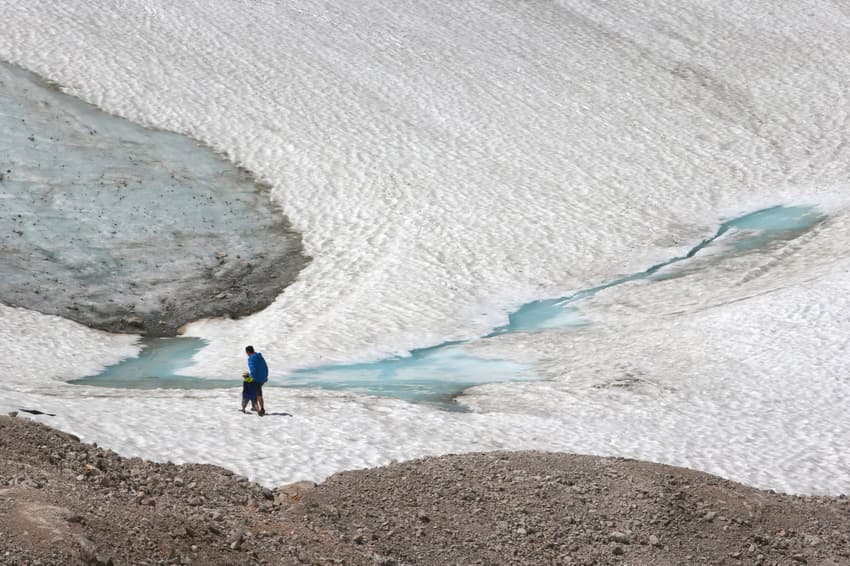Why it's a bad year for Germany's Alpine glaciers

Germany's glaciers could melt rapidly this year due to mild temperatures and little snow, experts say. Germany's five glaciers - such as the Schneeferner - are located in the Zugspitze area and in the Berchtesgaden Alps.
Due to climate change they have been melting dramatically in recent years, and have lost about about two-thirds of their volume in the past decade.
And the glaciers are facing a particularly tough year. Glaciologist Christoph Mayer, of the Academy of Sciences in Munich, said the combination of the mild weather and the low volume of snow could accelerate their melting.
He said the low level of snow is an issue because new glacier ice can't form, and because the snow cover that would protect glaciers from solar radiation isn't sufficient. The snow cover reflects the sunlight and if the glaciers were to lie virtually "bare" without snow, they would melt much faster.
READ ALSO: 8 of the coolest places in Germany to visit on hot days
Another phenomenon is causing additional problems for the glaciers this year: the Sahara dust cloud. This forms a dark layer on the snow cover and causes it to melt faster, said the glaciologist.
Till Rehm is a geophysicist who's been a regular visitor to the Schneefernerhaus, a former hotel in the Alps that is now used as an environmental research station on the Zugspitze, since 2007.
He has been observing how the glacier that lies "on his doorstep" is becoming less and less.
"It's sad to see how quickly this is happening," he told Bavarian broadcaster BR24. "A glacier like this takes many thousands of years to grow and now it is melting so quickly. That is already very alarming."
Germany's glaciers 'could melt in a decade'
A new report by the Bavarian Commission for Glaciology estimates that the Schneeferner Glacier on the Zugspitze will be gone in 10 to 15 years.
Attempts by operators to protect parts of the glacier with white sheeting were ultimately abandoned because the total cost was "too great", said Rehm. It was also not clear how effective the operation would be.
READ ALSO: Germany could lose last glaciers in 10 years
Mayer said the melting is a clear indicator of how the climate is changing.
He expects that the glaciers in the Bavarian Alps such as the Schneeferner on the Zugspitze, and the Blaueis in the Berchtesgaden Alps, will disappear completely in the near future.
Vocabulary
Glacier - (der) Gletscher
To melt - schmelzen/abschmelzen
Sahara cloud/dust - (der) Saharastaub
To observe - beobachten
We’re aiming to help our readers improve their German by translating vocabulary from some of our news stories. Did you find this article useful? Let us know.
Comments
See Also
Germany's five glaciers - such as the Schneeferner - are located in the Zugspitze area and in the Berchtesgaden Alps.
Due to climate change they have been melting dramatically in recent years, and have lost about about two-thirds of their volume in the past decade.
And the glaciers are facing a particularly tough year. Glaciologist Christoph Mayer, of the Academy of Sciences in Munich, said the combination of the mild weather and the low volume of snow could accelerate their melting.
He said the low level of snow is an issue because new glacier ice can't form, and because the snow cover that would protect glaciers from solar radiation isn't sufficient. The snow cover reflects the sunlight and if the glaciers were to lie virtually "bare" without snow, they would melt much faster.
READ ALSO: 8 of the coolest places in Germany to visit on hot days
Another phenomenon is causing additional problems for the glaciers this year: the Sahara dust cloud. This forms a dark layer on the snow cover and causes it to melt faster, said the glaciologist.
Till Rehm is a geophysicist who's been a regular visitor to the Schneefernerhaus, a former hotel in the Alps that is now used as an environmental research station on the Zugspitze, since 2007.
He has been observing how the glacier that lies "on his doorstep" is becoming less and less.
"It's sad to see how quickly this is happening," he told Bavarian broadcaster BR24. "A glacier like this takes many thousands of years to grow and now it is melting so quickly. That is already very alarming."
Germany's glaciers 'could melt in a decade'
A new report by the Bavarian Commission for Glaciology estimates that the Schneeferner Glacier on the Zugspitze will be gone in 10 to 15 years.
Attempts by operators to protect parts of the glacier with white sheeting were ultimately abandoned because the total cost was "too great", said Rehm. It was also not clear how effective the operation would be.
READ ALSO: Germany could lose last glaciers in 10 years
Mayer said the melting is a clear indicator of how the climate is changing.
He expects that the glaciers in the Bavarian Alps such as the Schneeferner on the Zugspitze, and the Blaueis in the Berchtesgaden Alps, will disappear completely in the near future.
Vocabulary
Glacier - (der) Gletscher
To melt - schmelzen/abschmelzen
Sahara cloud/dust - (der) Saharastaub
To observe - beobachten
We’re aiming to help our readers improve their German by translating vocabulary from some of our news stories. Did you find this article useful? Let us know.
Join the conversation in our comments section below. Share your own views and experience and if you have a question or suggestion for our journalists then email us at [email protected].
Please keep comments civil, constructive and on topic – and make sure to read our terms of use before getting involved.
Please log in here to leave a comment.